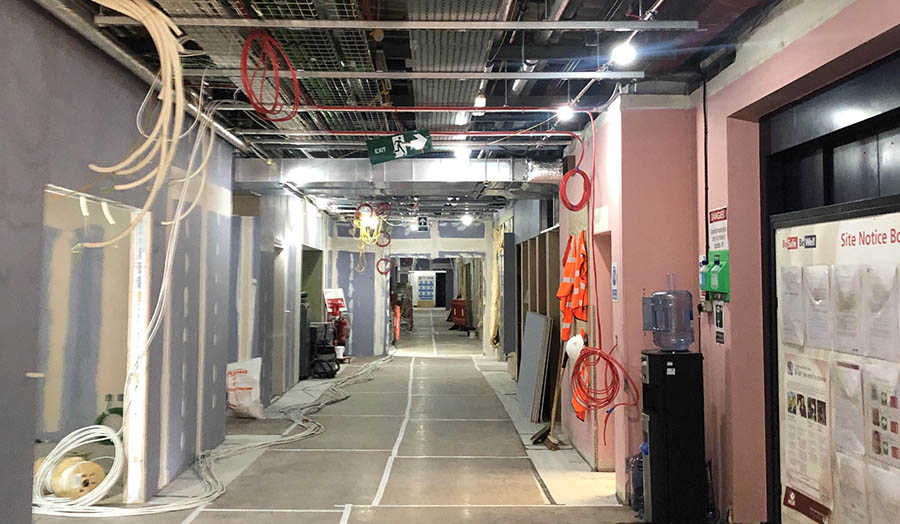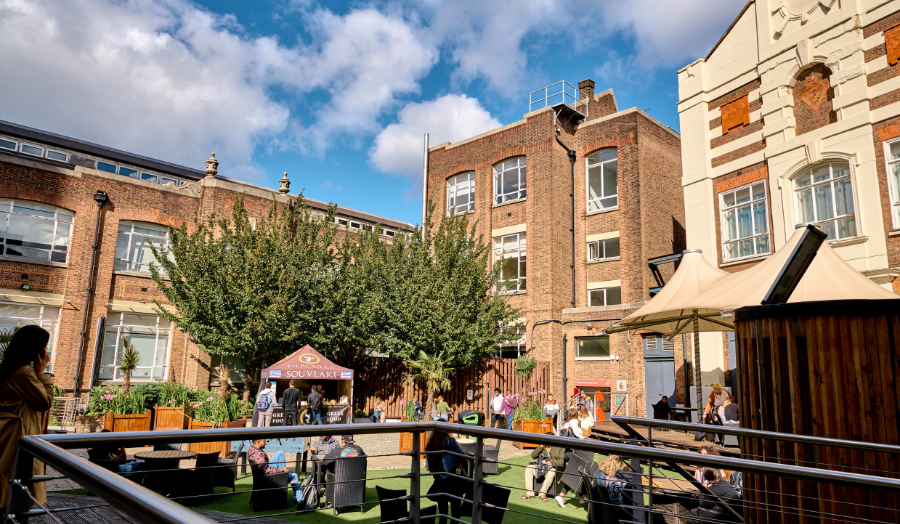Apply for this course
Please select when you would like to start:
Use the apply button to begin your application.
If you require a Student visa and wish to study a postgraduate course on a part-time basis, please read our how to apply information for international students to ensure you have all the details you need about the application process. This course is a full-time course with no part-time option.
Why study this course?
Are you passionate about supporting people of all ages to improve their health and wellbeing? Want to see your expertise put into practice as your patients maximise their movement and function, to recover from injury, diseases, illnesses and the impact of ageing? Train as a physiotherapist on this postgraduate degree course at London Met. If you already have a science-based undergraduate degree then studying this course could be the start of a rewarding professional journey.
Our accelerated two-year qualifying course has been developed in collaboration with our highly experienced practice-based partners from a wide variety of health and social care settings, service users and student partners. This course will see you acquire knowledge of the clinical sciences underpinning physiotherapy practice, along with contemporary skills and attitudes to work flexibly across diverse settings within a modern health and social care sector.
Study a course tailor-made by industry professionals
This course has been developed in collaboration with our highly experienced practice-based partners from a wide variety of health and social care settings, service users and student partners
Learn about all the major aspects of physiotherapy
You will acquire knowledge of the clinical sciences underpinning physiotherapy practice, along with contemporary skills and attitudes to work flexibly across diverse settings within a modern health and social care sector
Boost your career prospects
Our curriculum nurtures the skills, behaviour and values necessary to your career-long development and practice
Course modules
The modules listed below are for the academic year 2024/25 and represent the course modules at this time. Modules and module details (including, but not limited to, location and time) are subject to change over time.
Year* 1 modules
Year 2 modules
Applied Sciences
This module currently runs:all year (September start) - Monday morning
(core, 20 credits)
Applied Sciences is a year-long module taken by pre-registration Physiotherapy students in the first year of their programme to support the development and application of knowledge and understanding of biological (anatomy and physiology), psychological, and social aspects of human sciences to deal with issues affecting health and wellbeing, within a biopsychosocial context.
The teaching and learning focusses on developing understanding of human functioning, including the exploration of dysfunction and recovery processes. This is facilitated through engagement with the core sciences of anatomy, pathology physiology, psychology, and sociology. The module will run alongside Physiotherapy Theory and Practice 1 and 2 modules (PT7003 & PT7004) to provide opportunity to further embed this knowledge and understanding to support Physiotherapy practice across the lifespan.
Anatomy topics will introduce you to the normal structure and function of the human body including structural and functional anatomy of the lower limb, lumbar spine, pelvis, upper limb, thoracic, cervical spine, respiratory, cardiac, and nervous systems. Physiology of the following systems including muscle, respiratory, digestive, skeletal, cardiovascular, and nervous systems will be explored. The pathological changes associated with damage of the bodily systems including healing will also be considered alongside a consideration of the development of common illnesses and diseases. Health psychology will explore core psychological theories, principles across lifespan and the role of the biopsychosocial model in the understanding of human functioning. Sociology will also explore key concepts that can be applicable to the understanding of health and illness in individuals and populations.
This module will,
- provide you with opportunities to develop a systematic understanding of the biological, psychological, and social sciences that underpin health and wellbeing in individuals and populations.
- Support you to apply a critical understanding of biological, psychological, and sociological knowledge to interpret the signs and symptoms seen in individuals affected by dysfunction of normal human functioning in contemporary practice.
- enable you to apply scientific concepts to understand how common problems may affect human functioning using the biopsychosocial model.
Foundations of Professional Practice
This module currently runs:autumn semester - Wednesday morning
(core, 10 credits)
Foundations of Professional Practice module addresses several standards of proficiency relevant to Physiotherapy practice and the standards of conduct, performance and ethics of the Health and Care Professions Council (HCPC). It focuses on introducing students to contemporary issues affecting professional practice including legislation, professional accountability, ethics, and inter-professional working/multidisciplinary approach. It will also develop understanding and use of communication to support patients and their families, inter-professional working, and leading others. It will introduce the concept of continuing professional development and explore tools for developing career-long learning.
This module will:
- Provide you with opportunities to explore relevant issues to contemporary professional practice,
- Support development of your awareness of legal and ethical frameworks for professional practice including HCPC & CSP code of conduct
- Develop your awareness and ability to use communication skills to support professional practice.
- Provide you with tools and skills for continuous professional development of your career.
- Provide opportunities for interprofessional learning with other allied health professional students.
Physiotherapy Theory & Practice 1
This module currently runs:all year (September start) - Wednesday morning
all year (September start) - Tuesday morning
(core, 20 credits)
This module develops students’ ability in a range of core knowledge, skills and attitudes required for the assessment, communication, problem identification, goal setting, treatment, management, and evaluation of effective Physiotherapy practice when working with individuals with long term conditions affecting musculoskeletal, cardiorespiratory, and neurological conditions.
Its emphasis will be on evidence-based clinical reasoning and problem solving, which is developed through critical engagement with theoretical evaluation of human movement and functioning and practical skills development. It will consider physiotherapy within contemporary healthcare frameworks as part of the multidisciplinary approach to ensuring recovery, rehabilitation, re-ablement and self-management of individuals with long term conditions. Students will learn and practice effective and contemporary clinical hands-on skills required to optimise outcomes for individuals with long-term conditions commonly encountered in practice. It will also develop the skills and understanding, including public health approaches to support continuing health and wellbeing in this population.
The module will run alongside applied sciences (PT7001) and physiotherapy theory and practice 2 (PT7004) to allow students to utilise human science as the basis of their evidence-based Physiotherapy management of commonly encountered problems in clinical practice.
Read full detailsPhysiotherapy Theory & Practice 2
This module currently runs:all year (September start) - Wednesday afternoon
all year (September start) - Tuesday afternoon
(core, 20 credits)
This module develops students’ ability in a range of core knowledge, skills and attitudes required for assessment, problem identification, goal setting, treatment, and management of individuals with acute illness or injury.
Its emphasis will be on evidence-based clinical reasoning and problem solving, which is developed through critical engagement with the theoretical basis of human functioning and practical skills. It will consider physiotherapy as part of a multidisciplinary approach to ensuring patient safety, recovery, and a positive experience of care in the acute and primary care settings. Students will learn and develop effective and contemporary clinical hands-on skills to manage the consequences of common acute injuries, illnesses, and emergency conditions to ensure patient safety, prompt resolution of illness and restoration of function.
The module will run alongside the applied sciences module (PT7001) and the other physiotherapy theory and practice module (PT7003) to allow students to enable students to utilise human science as the basis of their evidence-based Physiotherapy management of commonly encountered problems in clinical practice.
Read full detailsPractice Education 1
This module currently runs:all year (September start) - Thursday
all year (September start) - Wednesday afternoon
(core, 0 credits)
This is the first of two zero-credit weighted practice education modules in the pre-reg MSc Physiotherapy course, and it is aimed at supporting students to complete mandatory practice-based learning elements required to graduate with eligibility to register as a Physiotherapist. This module gives students the opportunity to practice and consolidate clinical and non-clinical skills learnt in first year academic modules under the supervision and guidance of clinical educators within healthcare environments, working within their expanding scope of practice, managing own workload, maintaining own health, multi-disciplinary working including with service users, clinical governance, information management etc and continuing professional development (CPD) under the guidance of clinical educators within a healthcare environment. As a zero-credit weighted module, it does not contribute to your MSc pre-reg award, but it must be passed to graduate as a Physiotherapist.
Practice Education 1 comprises two Level 5 practice placements: one longitudinal and a block practice placements. Longitudinal placement will comprise one-day a week practice-based learning (7-hours/day) in the autumn and winter semesters and include 5 days of clinical simulation in the University and 20 days of practice-based placement in a clinical setting, adding up to 5 weeks. The block placement will be a 6-week (37.5 hours/week) placement in a contemporary clinical setting over the summer. Whilst on both placements, students will be expected to undertake directed study (identified reading) and private study according to support their clinical practice and continuing education.
There will also be taught contents prior to students going on placement to set expectations, ensure safe and competent practices are highlighted, and students are aware of how to appropriately report any issues while on clinical placement.
Reflective practice will play a key role in the learning process to develop and enhance clinical reasoning and practical skills.
Read full detailsResearch Methods for Practice
This module currently runs:all year (September start) - Monday afternoon
(core, 20 credits)
This module provides opportunities for students to consolidate and extend their research knowledge & skills to be critical users of research for evidence-based practice. It will provide students with the opportunity to utilise sound scientific understanding to interrogate research databases to identify relevant and appropriate research evidence to answer clinical questions The module covers practical skills and tools for critical analysis of qualitative and quantitative research methodologies used in service quality improvement and clinical research.
Lectures will be utilised to introduce principles of research methodologies, frameworks, application to practice, and critically appraisal tools. This will provide a foundation for evidence synthesis group discussions, where students will apply this knowledge to critically appraise research papers to identify answers for clinical questions. Where appropriate, established researchers will be invited to share their experiences with the students, to provide practical insights into conducting research.
Read full detailsAdvancing Physiotherapy Practice
This module currently runs:all year (September start) - Thursday morning
summer studies
(core, 40 credits)
This module aims to give students the opportunity to apply their understanding of scientific enquiry and research skills to undertake a primary research or secondary research, clinical audits, service evaluation that is pertinent to advancing physiotherapy theory and practice and disseminate the findings.
The module will provide students with a masters level research in collaboration with an experienced research supervisor who can be academic or clinical. It will also enable students to work in research teams and develop knowledge and skill that will support career long ability to continue contributing to the advancement of clinical knowledge and practice.
Read full detailsLeadership & Service improvement
This module currently runs:all year (September start) - Monday
(core, 20 credits)
The leadership and service improvement module builds on the foundation of the professional practice module to advance students' awareness of their own values, working with other people and leading others within health and social care environments. The module will provide opportunities for students to explore their own values, personality and attributes within the context of styles of leadership to develop self-confidence and emotional intelligence for accountable leadership of self and with clients and colleagues. It will also consider team working and models of leadership and provide opportunities to reflect on past group working activities to develop skills to influence others and evaluate clinical practice.
It will critically consider the processes, frameworks and tools used to improve healthcare services, business, and entrepreneurial skills. Students will also have the opportunity to prepare for their first job by considering mentoring and preceptorship programmes and how to optimise these opportunities.
Physiotherapy Theory & Practice 3
This module currently runs:all year (September start) - Tuesday afternoon
all year (September start) - Wednesday
(core, 30 credits)
This module extends the learning from physiotherapy theory and practice 1 and 2 (PT7003 & PT7004) to the management of individuals with complex clinical cases referred for physiotherapy interventions across a range of diverse clinical contexts and settings. It will also explore the roles of physiotherapy in the management and health promotion of individuals within populations that may be referred for Physiotherapy interventions and management in contemporary practice.
Students will further develop their clinical reasoning skills required to systematically work with broader multi-professional care teams within complex contemporary healthcare frameworks and services. The module will enable you to consider the needs of service users with complex and continuing care needs and enhance your ability to identify the potential contribution of physiotherapy to the population’s health and well-being.
The module will run alongside practice placement opportunities (placement 3 and 4) which will provide opportunities to integrate the learning in this module into the clinical setting. Through all these, you will acquire the knowledge, understanding and preparation for transition into contemporary professional practice within a dynamic health and social care environment.
Read full detailsPractice Education 2
This module currently runs:all year (September start) - Tuesday morning
(core, 0 credits)
This is the second zero-credit weighted practice education module in the Pre-reg MSc Physiotherapy course, and it is aimed at supporting students to complete mandatory practice education elements required to apply for professional membership with the CSP and graduate with eligibility to register as a Physiotherapist. This module gives students the opportunity to further consolidate their theoretical knowledge, understanding, practical and clinical skills to make the transition to an entry level Physiotherapist. In addition, it will enable them embed core professional practice requirements such as working within their expanding scope of practice, managing own workload, maintaining own health, multi-disciplinary working including with service users, clinical governance, information management etc and continuing professional development (CPD) under the guidance of clinical educators within a healthcare environment. As a zero-credit weighted module, it does not contribute to your MSc pre-reg award, but it must be passed to graduate as a Physiotherapist.
Practice Education 2 comprises three Level 6 practice placements, each of which will be 6 weeks long (37.5-hours/week) and occur in the autumn, winter, and summer months of the second year. The first two will be selected by the Physiotherapy practice education team and the third placement is an elective one, where students will have the opportunity to identify areas of practice they want to experience in practice.
Whilst on placement, students will also be expected to undertake identified reading and private study to support their continuous learning.
There will be taught content prior to students going on placement to set expectations, and ensure that students are safe, and are aware of how to appropriately report any issues while on placement. Reflective practice will play a key role in the learning process to develop and enhance clinical reasoning and practical skills.
Read full details






















